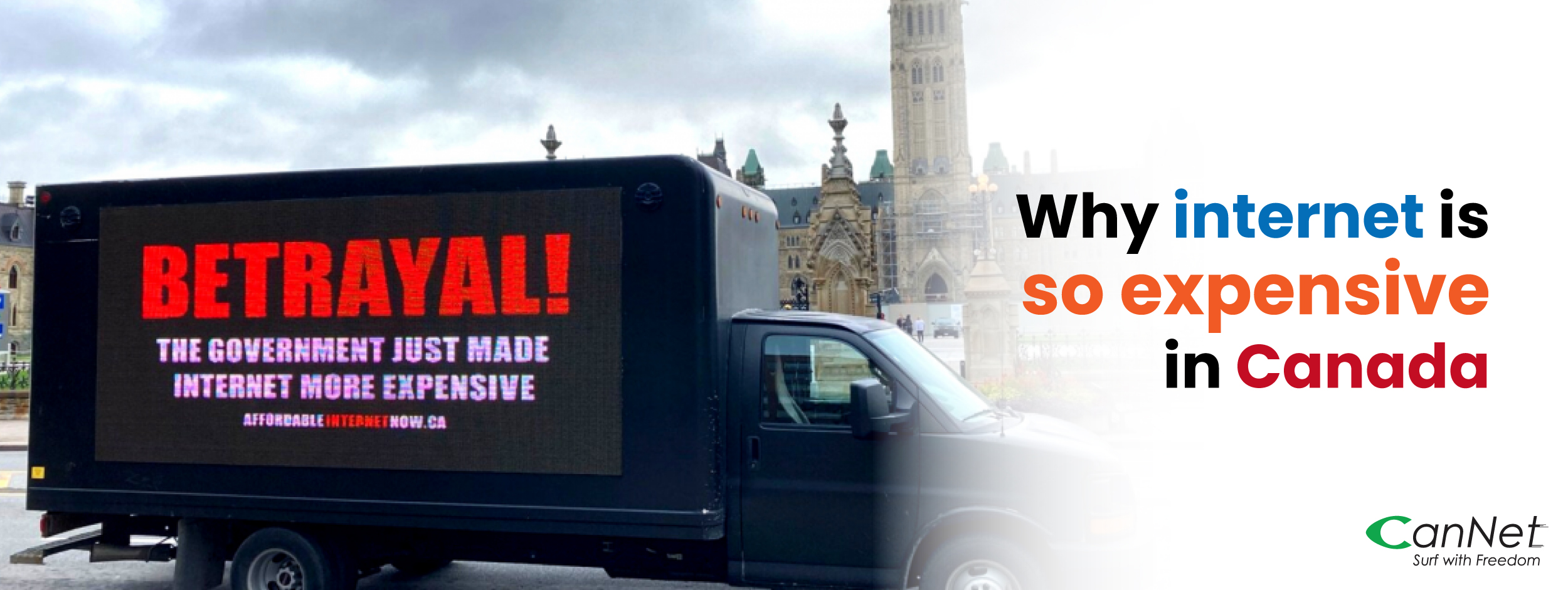Why is internet so expensive in Canada?
Canada currently has the 2nd most expensive internet (only behind the United States) of the G7 countries for speeds over 41 Mbps and has consistently been the 2nd or 3rd most expensive for at least the past 5 years. There is no “cheap” internet in Canada.
The Big 5 Canadian Internet Service Providers (ISPs) such as Bell, Rogers, Telus, Shaw and Videotron, receive 73.3% of the market’s revenues and charge higher prices due to lack of competition.
The lack of competition is due to a wide variety of factors including the industry’s high barrier to entry, large market share, restricted foreign investment, potential for price coordination and history of privatization and acquisitions.
The national telecom companies have a go-to list of reasons why prices are high, commissioning their own studies to try and disprove the cost disparity by claiming that the prices are “affordable” and trying to discredit independent studies (not paid for by Canadian telecoms) by claiming their methods are flawed.
Actions taken by the government and CRTC over the years to address industry competition, affordability and consumer choice have brought about slow or even halted progress.
The Canadian government has promised Canadians internet affordability for years and ordered the CRTC in 2019 to focus on affordability, competition and putting consumers first. Based on an extensive review of the industry, the CRTC reduced the wholesale rates a couple of months later - a win for consumers.
In response, many major ISPs issued threats and warnings saying that they would cut their investments in rural service infrastructure if wholesale internet rates were increased.
This hit the government’s weak spot. Universal high speed internet access – particularly in rural, remote and northern communities is a major component of the government’s platform, but it unfortunately does not include any mention of the affordability of the access provided, which helps explain what came next.
9 months later, the government asks the CRTC to re-evaluate their decision and essentially “go back to the drawing board”.
In May 2021, rather than finding a balance and setting middle-ground prices that both sides could reluctantly accept, the CRTC reverted wholesale rates all the way back to 2016 – ignoring their previous directives from the government and throwing out almost 5 years of their own work and findings in the process – a major win for the major ISPs and a huge loss for third-party internet providers such as CanNet.
Access to affordable, reliable and high-speed Internet is a necessity for all Canadians, which is what we have been fighting for since our inception in 2009. CanNet Telecom is among one of the independent ISPs who is hit hard by this unfair CRTC decision.
The CRTC (Canadian Radio-television and Telecommunications Commission) is the regulatory body in charge of setting and enforcing the rules in Canada’s broadcast and telecommunications industries. It declared broadband internet a basic service in Canada in 2016, and connectivity is increasingly vital for competing on the global stage and ensuring the continued growth of the Canadian economy.
The Competition Bureau’s report has found that most Canadians are well-served by world class broadband networks, and that Canadians are generally satisfied with their internet service provider (but that that those who use independent ISPs report higher satisfaction than those who use major ISPs). The Canadian Internet Registration Authority (CIRA) – who manage .ca domain names – similarly reports 81% satisfaction with home internet speed.
However, prices for the level of internet service quality we have here continue to be some of the highest in the developed world.
Any person living in Canada can tell you that we pay exorbitant rates for internet services. But how much more do we actually pay compared to similar countries such as the USA and Australia?
The annual Price Comparisons of Internet Services report that monthly prices for specific speeds against those of 7 other developed countries found that Canada currently has the 2nd most expensive internet (only behind the USA) for speeds over 41 Mbps and has consistently been the 2nd or 3rd most expensive for at least the past 5 years.
The reports have been commissioned by the federal government for 13 years and counting and are completed by a 3rd party consulting firm. The cost of home high speed internet had been trending downward in recent years, but jumped back up in 2020. Canadians’ appetite for more data and use of faster and faster internet speeds are contributing to a general increase in their communications bills. Canadians still pay some of the highest rates for mobile data and internet in the world.

